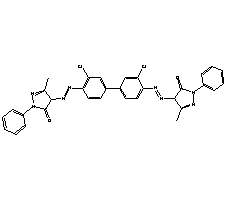Pigmento naranja 13
| nombre del producto | PIGMENT ORANGE 13 |
| Sinónimos | C.I.Pigment Orange 13; C.I.PO13; PO13; P.O.13 |
| CI | 21110 |
| NO CAS. | 3520-72-7 |
| EINECS | 222-530-3 |
| Peso molecular | 623.49 |
| Fórmula molecular | C32H24Cl2N8O2 |
| Densidad | 1,42 g / cm3 |
| Color | Polvo de naranja |
![]()
Fórmula de estructura molecular:

Fastness Properties of Pigment Orange 13:
| Resistencia a la luz | 3-4 |
| Resistencia al calor (℃) | 180 |
| Resistencia al agua | 4-5 |
| Resistencia al aceite | 5 |
| Resistencia ácida | 4-5 |
| Resistencia a los álcalis | 4-5 |
| Resistencia al alcohol | 3-4 |
Aplicación principal: Tinta a base de agua, Tinta offset, Tinta a base de solvente, Plástico, Pintura, Impresión textil
Tenemos varios grados y propiedades de pigmentos para satisfacer las necesidades de los diferentes clientes; especifique su aplicación y requisitos para que podamos recomendarlos en consecuencia. Correo electrónico: sy@sypigment.com
Product Description of Pigment Orange 13:
Pigmnet Orange 13 is used for coloring of ink, plastic, rubber, pigment printing paste and cultural and educational supplies; the shade is similar to that of Pigmento naranja 34, and the translucent specific surface area is 35-40m2/g (Irgalite Orange D specific surface area is 39m2/g); plastic PVC coloring is not recommended due to migration; Natural rubber is resistant to vulcanization and migration, so it is suitable for rubber coloring; detergent resistant, good water resistance, used for swimming articles, sponge, viscose fiber pulp, packaging ink and metal decorative paint coloring, heat resistance (200 ℃); and for rubber industry.
Pigment Orange 13 is an organic compound and an azo compound. It is a commercial orange pigment. It is also classified as a diarylide pigment, being derived from 3,3'-dichlorobenzidine. It is closely related to Pigment Orange 3, wherein the two phenyl groups are replaced by p-tolyl groups.
Pigment Orange 13 is coloristically very similar to Pigment Orange 34, but generally somewhat more yellow. Application of Pigment Orange 13 in polyolefins is limited. The pigment is very fast to detergents. It is also employed in viscous spin dyeing and in mass dyeing. The graphics industry, on the other hand, uses pigment orange 13 to an appreciable extent for packaging printing inks. Its fastness to light is average but the stability of pigmented prints to a number of organic solvents is excellent or almost perfect. Similarly, the prints are fast to paraffin, butter, and soap. They withstand heat very well and are stable up to 200°C. Pigment orange 13 thus lends itself to metal decor printing, provided its light-fastness suits the purpose. Likewise, its resistance to clear lacquer coatings and to sterilization is excellent.
TDS (Pigment Orange 13) MSDS (Pigment Orange 13)Sinónimos
- Pigmento naranja 13
- 4,4′-((3,3′-Dichloro-[1,1′-biphenyl]-4,4′-diyl)bis(diazene-2,1-diyl))bis(3-methyl-1-phenyl-1H-pyrazol-5(4H)-one)
- SCHEMBL2641824
- AKOS025311122
- AKOS030627473
- Pigment Orange 13; 4,4′-[(3,3′-Dichloro[1,1′-biphenyl]-4,4′-diyl)bis(azo)]bis[2,4-dihydro-5-methyl-2-phenyl-3H-pyrazol-3-one]
- C.I.21110
- P0596
- H10760
- W-109143
Nombre IUPAC: 4-[[2-chloro-4-[3-chloro-4-[(3-methyl-5-oxo-1-phenyl-4H-pyrazol-4-yl)diazenyl]phenyl]phenyl]diazenyl]-5-methyl-2-phenyl-4H-pyrazol-3-one
InChI: InChI=1S/C32H24Cl2N8O2/c1-19-29(31(43)41(39-19)23-9-5-3-6-10-23)37-35-27-15-13-21(17-25(27)33)22-14-16-28(26(34)18-22)36-38-30-20(2)40-42(32(30)44)24-11-7-4-8-12-24/h3-18,29-30H,1-2H3
InChIKey: HKYYDLYCGBDWSB-UHFFFAOYSA-N
SONRISAS canónicas: CC1=NN(C(=O)C1N=NC2=C(C=C(C=C2)C3=CC(=C(C=C3)N=NC4C(=NN(C4=O)C5=CC=CC=C5)C)Cl)Cl)C6=CC=CC=C6
| Nombre de la propiedad | El valor de la propiedad |
| Peso molecular | 623.5 |
| XLogP3-AA | 7.6 |
| Recuento de donantes de enlaces de hidrógeno | 0 |
| Recuento de aceptores de enlaces de hidrógeno | 8 |
| Recuento de bonos giratorios | 7 |
| Masa exacta | 622.1399274 |
| Masa monoisotópica | 622.1399274 |
| Área de superficie polar topológica | 115 Ų |
| Recuento de átomos pesados | 44 |
| Cargo formal | 0 |
| Complejidad | 1090 |
| Recuento de átomos de isótopos | 0 |
| Recuento de estereocentros de átomos definidos | 0 |
| Recuento de estereocentros de átomos indefinidos | 2 |
| Recuento de estereocentros de enlaces definidos | 0 |
| Recuento de estereocentros de enlace indefinido | 0 |
| Recuento de unidades unidas covalentemente | 1 |
| El compuesto está canonizado | Sí |






